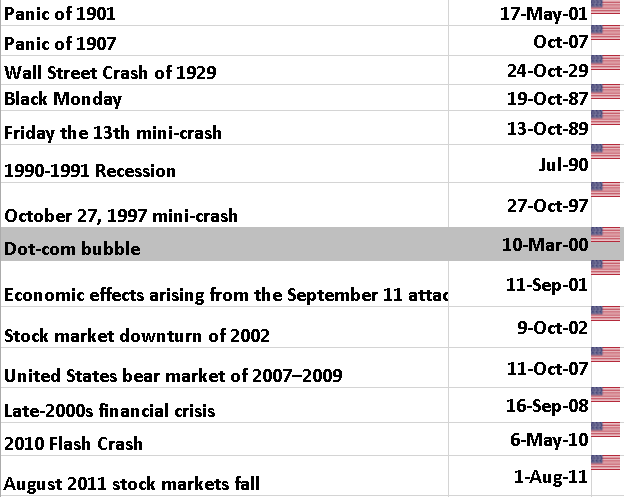Worst stock market months
Often in the financial media, you will hear people make reference to specific times of the week, month or year that typically provide bullish or bearish conditions. One of the historical realities of the stock market is that it typically has performed poorest during the month of September.
The "Stock Trader's Almanac" reports that, on average, September is the month when the stock market's three leading indexes usually perform the poorest. Since , the month of September has seen an average decline in the Dow Jones Industrial Average DJIA of 1. This is, of course, only an average exhibited over many years, and September is certainly not the worst month of stock-market trading every year.
There are several theories which attempt to explain this phenomenon.

One particular theory points to the fact the summer months usually offer light trading volumes on the stock market, as a good deal of investors typically take vacation time and refrain from selling stocks from their portfolio. Once fall begins these investors typically return to work and exit positions they had been planning on selling. When this occurs, the market experiences increased selling pressure, and thus an overall decline.
As well, many mutual funds experience their fiscal yearend in September. Mutual fund managers, on average, typically sell losing positions before yearend, and this trend is another possible explanation for the market's poor performance during September. To learn more about interesting market phenomena such as this, consider reading our Greatest Market Crashes Tutorial or Taking A Chance On Behavioral Finance. Dictionary Term Of The Day. A measure of what it costs an investment company to operate a mutual fund.
Stock Trader's Almanac - Strategy
Latest Videos PeerStreet Offers New Way to Bet on Housing New to Buying Bitcoin? This Mistake Could Cost You Guides Stock Basics Economics Basics Options Basics Exam Prep Series 7 Exam CFA Level 1 Series 65 Exam.
Sophisticated content for financial advisors around investment strategies, industry trends, and advisor education.
Why do people say that September is the worst month for investing? By Chris Gallant Share. The Dow refers to the Dow Jones Industrial Average DJIA , an important index that indicates how well the overall stock market Discover how the Dow Jones Industrial Average is used in the Dow Theory, which is used by traders to figure out the trend These stocks are trending lower and currently near a short sale areas, based on breaks lower and falling stock indexes.
January Effect, Etc: Which Months are Best (and Worst) for the Stock Market?
Discover the seasonal performance trends for the Fidelity Low-Priced Stock Fund, and learn which months have been the best and worst times to invest. Discover the performance trends of the Vanguard Mid-Cap Index Fund, and learn which times of the year the fund has performed its best and worst.
September is 'the worst month of the year for stocks' - Business Insider
Learn about some of the performance trends of the Vanguard Total Bond Market ETF, and discover which times of year the fund has performed at its best and worst. Too good to be true? Learn more about the T. Rowe Price Health Sciences Fund, including the historical performance and financial trends by quarter over the past five years. Get to know the most important market indices and the pros and cons of investing in them.
September and October have historically been the two most volatile months for stocks, which some advisors see as an opportunity. Learn about the performance of the Dow Jones Industrial Averages DJIA through the decades. The highest volume of publicly traded assets held by an individual, An expense ratio is determined through an annual A hybrid of debt and equity financing that is typically used to finance the expansion of existing companies.
A period of time in which all factors of production and costs are variable. In the long run, firms are able to adjust all A legal agreement created by the courts between two parties who did not have a previous obligation to each other. A macroeconomic theory to explain the cause-and-effect relationship between rising wages and rising prices, or inflation.
Chart of the Day - The worst month for stocks
A statistical technique used to measure and quantify the level of financial risk within a firm or investment portfolio over Content Library Articles Terms Videos Guides Slideshows FAQs Calculators Chart Advisor Stock Analysis Stock Simulator FXtrader Exam Prep Quizzer Net Worth Calculator. Work With Investopedia About Us Advertise With Us Write For Us Contact Us Careers. Get Free Newsletters Newsletters. All Rights Reserved Terms Of Use Privacy Policy.